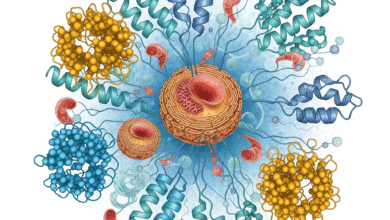Avoid These Protein Intake Mistakes for Weight Loss Calculation

Protein is very important for our health. It helps keep us healthy and feeling good. Losing weight? Have enough protein in your diet – it helps you feel full and maintain muscle mass. Calculating your daily protein intake for weight loss can be difficult. Many mistakes are common when trying to do so. In this article, we’ll discuss the errors to avoid when calculating your daily protein intake for weight loss. We’ll also give you tips and tricks to get it right.
Understanding the Importance of Protein in Weight Loss
To make it easier for high school students to understand how protein affects weight loss, let’s start by discussing its significance. After that, we’ll look at the common errors to avoid when calculating how much protein you need to consume daily to lose weight. Protein is important for your body. It helps build and fix tissues, especially muscles. Trying to lose weight? Eat enough protein to keep your muscles while in a calorie deficit. Muscle tissue is crucial because it burns calories even when you’re not active. So, the more muscle mass you have, the more calories your body will burn throughout the day.
Protein makes you feel fuller longer after eating. Losing weight is easier when you don’t overeat or snack between meals. This method can be helpful for that.
Common Mistakes to Avoid When Calculating Protein Intake
We talked about how protein affects weight loss. But people often make mistakes when figuring out how much they need each day. Let’s look at these errors more closely.
Not Accounting for Your Lean Body Mass
Many people forget to include their lean body mass when calculating their daily protein intake – a common mistake. Your lean body mass includes everything in your body that isn’t fat, such as muscle, bone, and organs. To lose weight, calculate the amount of protein you need daily by finding your lean body mass. This helps determine how much protein you need to maintain your muscle mass.
Relying on General Recommendations
Another mistake people make is relying on general recommendations for protein intake. While there are guidelines for protein intake, they are not one-size-fits-all. Your need for protein varies based on your age, sex, weight, and amount of physical activity. So, it’s important to calculate your protein intake based on your individual needs.
Forgetting to Adjust for Weight Loss
To lose weight, change your protein intake as needed. When you’re in a calorie deficit, your body needs more protein to preserve muscle mass. If you want to lose weight, consider adding more protein to your diet to make sure you’re getting enough.
Ignoring Protein Quality
Not all protein sources are created equal. Animal-based proteins are a good source of protein because they have all the amino acids your body needs. Plant-based proteins may not have all the essential amino acids. You may need to combine multiple sources to get them all. It’s important to consider protein quality when calculating your daily protein intake.
Overdoing It on Protein
While protein is important for weight loss, it’s possible to overdo it. Consuming too much protein can lead to weight gain and other health issues. So, it’s important to calculate your protein needs accurately and not exceed them.
Not Spreading Out Protein Intake Throughout the Day
People often don’t eat enough protein during the day. One common mistake is not eating protein regularly. Eating all your daily protein in one meal isn’t good for weight loss. Your body can’t absorb and use too much protein at once. To improve your health, make sure you eat protein throughout the day. This helps give your body what it needs.
Focusing Only on Protein and Ignoring Other Nutrients
While protein is important for weight loss, it’s not the only nutrient you need. Focusing only on protein is not good for your health. You also need carbohydrates and healthy fats. Include healthy foods in your diet to help you lose weight.
| You May Also Like | Protein Shakes and Weight Loss: Are They Effective and Safe? |
Tips for Calculating Your Daily Protein Intake for Weight Loss
We talked about protein intake errors to avoid earlier. Now, let’s learn some advice to calculate it correctly.
Calculate Your Lean Body Mass
To calculate your daily protein intake for weight loss, you need to know your lean body mass. To measure this, you can use body composition scales, skinfold calipers, or get a DEXA scan. You can figure out how much protein you need once you calculate your lean body mass. This is based on your own unique needs.
Use a Protein Calculator
A protein calculator can help you find the right amount of protein for you. It’s based on your individual needs. You can find protein calculators online. They consider your age, sex, weight, and activity level to tell you how much protein you need each day.
Choose High-Quality Protein Sources
Choose nutrient-rich proteins like lean meats, fish, eggs, and dairy for a healthier diet. If you’re looking for protein from plants and don’t eat meat, beans, lentils, and tofu are good choices. But to make sure you get all the essential amino acids, you may need to combine a few different sources.
Spread Out Protein Intake Throughout the Day
It’s essential to eat protein throughout the day to ensure your body gets enough of it. Aim to include a source of protein at each meal and snack to help keep you feeling full and satisfied.
Don’t Forget Other Nutrients
Protein is vital for weight loss, but remember to also get carbs and healthy fats. Eat healthy foods to stay healthy. Include foods with nutrients that are good for you in your diet.
Conclusion:
It can be tough to figure out how much protein you need for weight loss, but avoiding mistakes and following these tips will help you get enough protein to reach your weight loss goals. To determine your lean body mass, use a protein calculator and select quality protein sources. Consume protein throughout the day, along with other important nutrients. Remember these steps. You can help your body build and keep lean muscles while losing weight by doing this.
FAQs:
Q1: How much protein do I need for weight loss?
To lose weight, the protein amount you need depends on your age, sex, weight, and how active you are. A protein calculator can tell you how much protein to eat for weight loss.
Q2: Can I get enough protein on a plant-based diet?
Yes, you can get enough protein from plants. Eat beans, lentils, tofu, and tempeh for protein. If you eat different types of plant protein, you can get all the amino acids you need for your body.
Q3: Can eating too much protein hinder weight loss?
Eating too much protein can make it harder to lose weight. The body can turn excess protein into glucose and store it as fat. It’s crucial to achieve a proper mix of protein, carbs, and fat to aid in your weight loss efforts.
Q4: Are protein supplements necessary for weight loss?
Protein supplements aren’t needed for weight loss. You can get enough protein from whole foods. Protein supplements can help you get more protein if you’re busy or on the go. They are easy and convenient to use.
Q5: Can consuming too much protein be harmful to my health?
Consuming too much protein can cause health issues. These include kidney damage and higher chances of heart disease. If you want to change your diet, talk to a healthcare professional first. Also, make sure to eat the recommended amount of protein every day.




